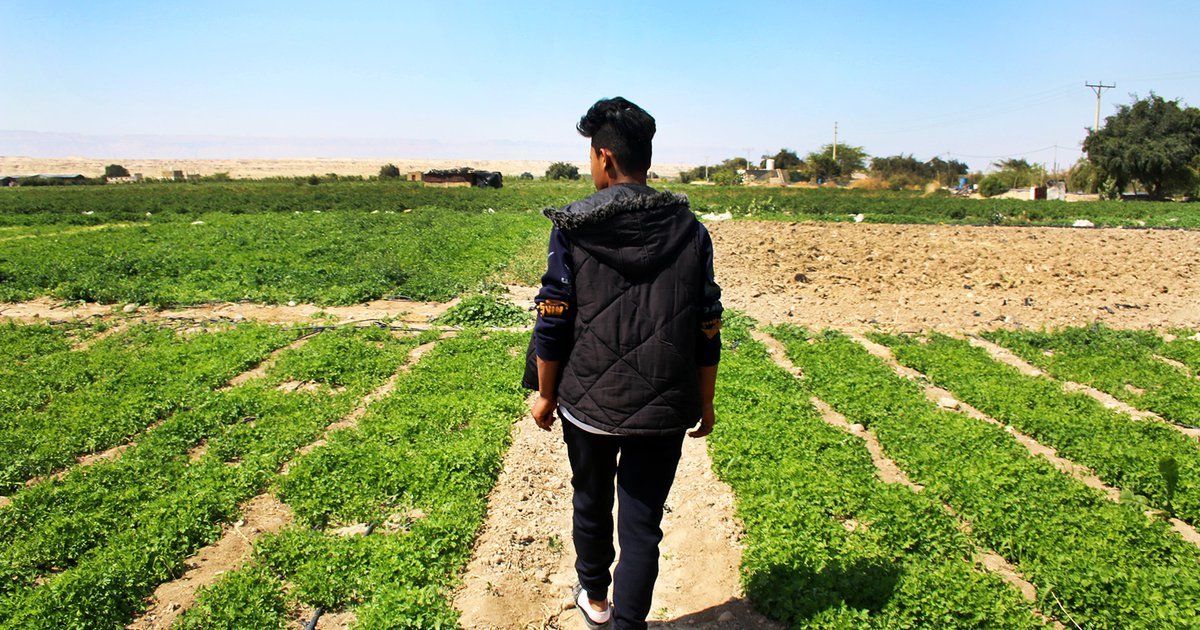Child workers in Jordan shoulder effects of rising poverty levels

Al Hami and Mohammed are currently establishing a UNICEF child labour programme in Ghour Al Mezraa, a rural agricultural area south of the Dead Sea. One of the children they identified for support is Hamza. Now 14, Hamza has worked on his family's farm for 12 hours a day, six days a week since he was 11. “I had a bad feeling when I had to leave school,” he said. “It was hard. I liked school, but I had to leave.”
Among other duties, Hamza sprays pesticides and herbicides on the crops. Because of the hazards associated with spraying chemicals, agricultural work is considered to be among the worst forms of child labour. When asked how he felt about his work, Hamza said, “I don't know how to explain it. You could say, thanks God, I'm supporting my family. But when I return to school and then maybe go to the army, I'll feel better.”
As part of their child protection programme, Rowad AlKhair has referred Hamza to the Ministry of Education in order to support his return to school. Mohammed said that, to facilitate this, Hamza's family will receive emergency cash assistance so they can pay off the debts that his income helps cover. It's about support, she said, rather than blame: “We are not working with the father or the mother as a perpetrator. They are families in need, and we work with them on how to respect the children's rights.”
Punitive responses to child labour
While the official narrative of governments and NGOs is centred around support, the response on the streets can look quite different. Punitive measures are often favoured by authorities, which generally exacerbate rather than address root causes such as poverty. Labour laws in Jordan dictate that employers should receive a fine of 50 JODs (£57) if a child under 16 is working for them, and 100 JODs (£113) on occasion of repeat offence. Oftentimes, however, the employer and the child may be members of the same family, and complex relationships or residency statuses can muddy the picture. Tamkeen, an organisation offering legal aid to child workers, often finds itself settling cases outside of court because of this. Linda Aklash, Tamkeen's director, said, “[The families] are afraid that maybe it will make problems for them, especially if they are refugees … many of them have a good relationship with the employers.”
Children living in the capital have also experienced punishment at the hands of the authorities. Begging is a criminal offence in Jordan, and anyone over the age of 12 can be charged. Shop owners in downtown Amman said that children as young as nine or 10 have told them that they've been arrested and detained for selling items on the streets or begging. Some children said they have been held for up to a week. Fadi Amireh, the owner of Jadal, a cultural centre in downtown Amman, said he notices when these children go missing, or when there are changes. “I saw one of them with his hair all cut,” Amireh said. “I asked him if he was okay, and he told me that he was arrested in Jabal Al Weibdeh [central Amman] by officials because of selling things.”
Amireh added that government policies are making things worse, not better. “A few years ago, most of the working kids I saw were Syrians. Now it's mixed,” he said. “The economic situation is putting more and more pressure on people and it is resulting in such phenomena.”
This “Eyes on Trafficking” story is reprinted from its original online location.

ABOUT PBJ LEARNING
PBJ Learning is a leading provider of online human trafficking training, focusing on awareness and prevention education. Their interactive Human Trafficking Essentials online course is used worldwide to educate professionals and individuals how to recognize human trafficking and how to respond to potential victims. Learn on any web browser (even your mobile phone) at any time.
More stories like this can be found in your PBJ Learning Knowledge Vault.
EYES ON TRAFFICKING
This “Eyes on Trafficking” story is reprinted from its original online location.
ABOUT PBJ LEARNING
PBJ Learning is a leading provider of online human trafficking training, focusing on awareness and prevention education. Their interactive Human Trafficking Essentials online course is used worldwide to educate professionals and individuals how to recognize human trafficking and how to respond to potential victims. Learn on any web browser (even your mobile phone) at any time.
More stories like this can be found in your PBJ Learning Knowledge Vault.
